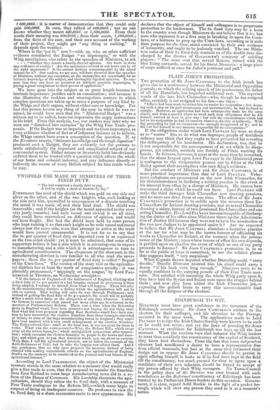TWOFOLD USE MADE BY MINISTERS OF THEIR FIXED DUTY.
"The bed contrived a double debt to pay, A bed by night, a chest of drawers by day."
EVERYBODY has read of the shield which was gold on one side and silver on the other, and of the two knights, who, each looking at the side next him, quarrelled in consequence of a dispute touching the metal it was made of, and their fatal duel. The shield was immovable ; and if the knights (as the moral appended to the story very justly remarks) had rode round and viewed it on all sides, they could have entertained no difference of opinion, and would not have fought. But had the shield been held by some person who kept turning it so that each knight as he rode round and round always saw the same side, even that attempt to arrive at the truth would have proved unsuccessful. It is not for us to say that the 8s. per quarter of fixed duty on imported corn is as equivocal as the two-sided shield : yet it must be admitted, that some of its supporters believe it has a side which it is advantageous to exposa to manufacturing, and a side which it is advantageous to turn to agricultural constituencies. The eloquence of the showmen in the manufacturing districts is now familiar to all who read the news- papers : there the 8s. per quarter of fixed duty is called " Repeal of the Corn-laws." The version of the story told to the agricultu- ral districts has at least the merit of comparative novelty : it was plausibly pronounced, "trippingly on the tongue," by Lord PAL.. MERSTON at Tiverton, on Wednesday sennight- " If the farmers of England—if the landowners uf England, thinking that a fixed duty of Si. per quarter is a bad bargain, succeed in preventing it from being adopted, I venture to foretell them what will happen. There will arise in the manufacturing districts a feeling which the agriculturists will not be able to control. That feeling will carry its way through Parliament ; and, instead of getting the fixed duty of 8s. p..r quarter, the result will be probably either a much lower duty, or the abrogation of any duty whatever. I advise the farmers to remember what passed not many years ago in reference to the question of Parliamentary Reform. There was a time when the Reforming party in England would have been content—not hoping for any thing more than what had been proposed regarding East Retford—would have been con- tent to have transferred the elective franchise from those boroughs convicted of bribery to some of the large manufacturing towns in England ; they would have been content with a very small enlargement of the elective franchise. The Tories refused that : small as the boon was, it was too great for them to make. What was the consequence ?—Why, the Reform Bill ; which swept away all the rotten boroughs; which extinguished corporation after corpora- tion; which extended the elective franchise to people in the towns and coun- ties; and which gave to you that franchise which you are about to exercise. Well, then, I tell the agricultural interest, not to follow the example of the Anti-Reformers of 1828, but to take the bargain now offered them. And I say, gentlemen, that we who have prepared the measure, instead of being charged with making unjustifiable attacks on the agriculturists of England, deserve on the contrary to be considered as the greatest and best friends of the agricultural interest."
According to Lord PALMERSTON, the object of the Ministerial measure stands in the same relation to a measure that would really give a free trade in corn, that the proposal to transfer the franchise from East Retford to some large manufacturing town did to a re- form of the House of Commons. His Lordship threatens the agri- culturists, should they refuse the 8s. fixed duty, with a measure of Free Trade analogous to the Reform Bill,—which many begin to suspect of being an inadequate measure. He professes to view the 8s. fixed duty as a sham concession made to save appearances. He declares that the object of himself and colleagues is to perpetuate protection to the landowners. The 8s. fixed duty may be a boon to the country even though Ministers do not believe that it is ; but men who represent it as a first step in breaking in upon the Corn. laws, or a buttress to prop up the Corn-laws, according as it suits their purpose for the time, stand convicted by their own evidence of insincerity, and ought to be jealously watched. The use Minis- ters make of their 8s. fixed duty reminds us of the double duty dis- charged by the dresses of GoEnsmmes company of strolling players : " The same coat that served Romeo, turned with the blue lining outwards, served for his friend Mercutio : a large piece of crape sufficed at once for Juliet's petticoat and pall."


























 Previous page
Previous page